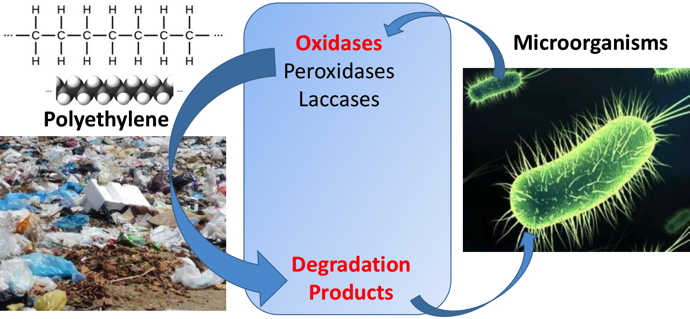V. Nivière, C. Caux
Plastic pollution is a major problem we have to face with.
Plastic bags and rigid polyethylene (PE) packaging are of particular concern because they constitute the major part of these wastes and moreover they appear to be rather resistant to biodegradation processes. In this context, knowledge of the biochemical mechanisms by which microorganisms can degrade these plastics represents an issue of primary importance. This will open up perspectives for making these biodegradation processes more efficient and will make possible to envisage new ways of recycling PE. The degradation of plastics in a natural environment is generally initiated by light and mechanical actions, following which microorganisms can intervene. However, although a number of bacteria that can degrade PE have been identified, their activities appear to be quite limited. The structure of PE, with its chemically very stable C-C and C-H bonds and a completely hydrophobic surface, effectively raises the question of the mechanisms by which enzymes can react effectively on it.
Currently nothing is known about these biodegradation mechanisms of PE.
It is possible that enzymes like peroxidase or laccase, secreted by the microorganisms oxidize these C-C and C-H bonds, leading to a fragmentation of PE into small functionalized pieces directly assimilable by the cells. It is moreover likely that this fragmentation of PE constitutes the limiting step of the process, explaining the very low efficiency of the microorganisms to degrade this polymer. Identifying these limiting factors would open the way to possible solutions to remedy them.

Hypothesis on the enzymatic mechanisms of degradation of polyethylene by microorganisms
In this context, we are developing this new project on the biodegradation of polyethylene plastics. This research project is transversal and involves collaborations with microbiologists, biochemists and chemists.
 Collaborations
Collaborations Dr. Olivier Hamelin, Bioinspired Chemistry and Environment team (BioCE), Laboratoire Chimie et Biologie des Métaux, CEA-Grenoble, 17 avenue des Martyrs, Grenoble
Dr. Thierry Rabilloud, Proteomics, Metals and Differentiation team (ProMD), Laboratoire Chimie et Biologie des Métaux, CEA-Grenoble, 17 avenue des Martyrs, Grenoble